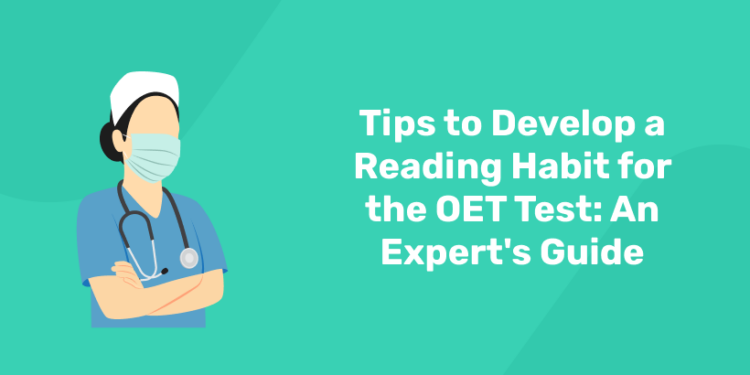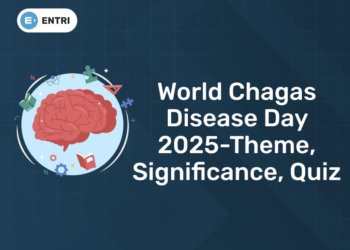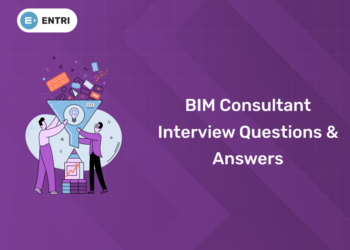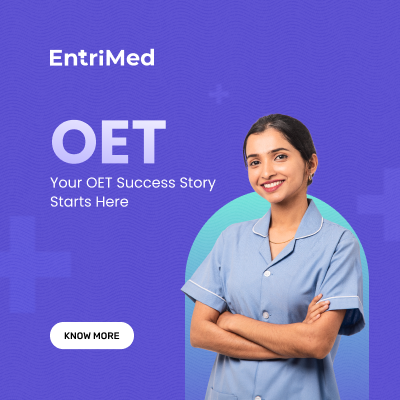Table of Contents
Building a strong habit of reading is vital for doing well in the OET Test. Experts suggest smart ways to develop a good reading routine that suits this test. In this article we will discuss Tips to Develop a Reading Habit for the OET Test: An Expert’s Guide. Reading regularly at specific times every day helps make it a habit. Pick OET-related materials and different topics to learn more. Taking notes or summarizing what you read helps you understand better. Spend time reading medical or healthcare books as the test focuses on these. Read from different sources like journals, articles, and cases to learn more. Make reading part of your everyday routine for ongoing learning. We will discuss more about this in this blog. So keep reading !!
Tips to Develop a Reading Habit for the OET Test: An Expert’s Guide
What is OET?
The Occupational English Test (OET) is an internationally recognized English language proficiency exam designed specifically for healthcare professionals. It assesses the language communication skills of healthcare workers seeking to work or study in an English-speaking environment, particularly in healthcare settings.
The OET evaluates candidates’ language proficiency in the context of their healthcare profession, focusing on four key language skills: Listening, Reading, Writing, and Speaking. The test content is tailored to the healthcare sector, featuring scenarios and topics relevant to various healthcare professions, including medicine, nursing, dentistry, pharmacy, physiotherapy, and more.
In this article we will be concentrating on how to fair well in the Reading section of this exam.
What to Expect in the Reading Section of the OET Test?
1: What is the primary purpose of a patient’s discharge summary?
In the Reading section of the Occupational English Test (OET), candidates can expect:
Variety of Healthcare Texts:
The section includes various texts related to healthcare, such as patient case notes, medical articles, reports, guidelines, or excerpts from healthcare-related books and journals.
Multiple Question Formats:
Candidates encounter different question types, including multiple-choice, matching information, matching headings, and summary completion tasks.
Healthcare Contexts:
The reading materials are centered around scenarios encountered in healthcare professions, covering topics like patient care, treatment procedures, medical policies, health conditions, or clinical studies.
Complex Information:
The texts often contain detailed medical terminology, technical language, and nuanced information typical of healthcare settings, challenging candidates’ comprehension abilities.
Time Constraints:
Candidates have a specific time limit to read the materials and answer the questions, requiring efficient time management during the test.
Focus on Specific Details:
Questions may require identifying specific information, understanding relationships between ideas, summarizing key points, or drawing inferences from the provided texts.
Application of Critical Skills:
Success in this section involves applying critical thinking, analytical, and skimming/scanning skills to extract essential information efficiently.
Candidates should prepare by practicing with healthcare-related texts, improving their medical vocabulary, refining their reading comprehension, and familiarizing themselves with the question formats commonly encountered in the OET Reading section.
Crack OET & Boost Your Healthcare Career!
OET Coaching by Entri App: Get expert guidance, practice with real exam scenarios, and achieve your target score to advance your healthcare career.
Join Now!Why Developing Reading Habit Is Essential For The OET Test?
Developing a reading habit is crucial for the OET test due to several key reasons:
Comprehension Skills:
The reading section of the OET assesses the candidate’s ability to comprehend and understand medical texts, patient records, case studies, and articles. A strong reading habit improves the candidate’s capacity to comprehend complex healthcare-related information accurately.
Vocabulary Expansion:
Regular reading exposes candidates to diverse medical terminology, helping them build a broader vocabulary essential for understanding and interpreting healthcare-related texts encountered in the test.
Critical Thinking:
A consistent reading habit nurtures critical thinking skills, enabling candidates to analyze and interpret complex medical information effectively. This skill is crucial for answering questions accurately in the OET test.
Time Management:
Regular readers tend to read faster and comprehend information efficiently, aiding in managing time effectively during the exam, especially in scenarios with limited time frames.
Confidence and Preparation:
A robust reading habit familiarizes candidates with a wide array of healthcare topics and formats similar to those encountered in the OET test. This familiarity in stills confidence and a sense of preparedness for tackling the reading section.
Expert Tips to Cultivate an Effective Reading Habit
Setting a Reading Schedule
- Allocating dedicated time for daily reading sessions
- Importance of consistency in developing a routine
Selecting Relevant OET Materials
- Guidance on choosing suitable OET-related content
- Diversifying reading materials to cover various medical topics
Implementing Active Reading Techniques
- Strategies like note-taking, summarizing, and annotating
- Enhancing comprehension and retention through active engagement
Focus on Specialized Medical Literature
- Importance of reading medical journals, articles, and texts
- Aligning reading habits with the specific requirements of the OET Test.
Expanding Reading Sources
- Exploring various resources such as case studies, practice tests, and online materials
- Enriching knowledge by exploring different reading materials
Incorporating Reading into Daily Life
- Strategies for integrating reading into daily routines
- Making reading a habitual part of everyday life.
Elevate your OET scores with Entri Expert Team! Join for Free Demo Class!
What to Read?
To prepare for the OET Reading test, it’s crucial to read a variety of healthcare-related materials. Here’s a list of recommended materials to enhance your reading skills for the test:
Patient Case Notes:
Practice reading patient case notes, including medical histories, symptoms, treatment plans, and progress reports.
Medical Journals and Articles:
Explore articles from reputable medical journals covering diverse topics in healthcare, such as new treatments, research studies, or healthcare policies.
Healthcare Guidelines and Protocols:
Review healthcare guidelines, protocols, or manuals relevant to different medical specialties or procedures.
Medical Textbooks:
Read sections from textbooks related to healthcare professions, covering topics like anatomy, physiology, pharmacology, or specific medical disciplines.
Research Papers:
Engage with research papers or scientific articles discussing clinical trials, advancements in medical technology, or case studies.
Healthcare Blogs or Online Resources:
Follow healthcare-related blogs, online forums, or reputable websites offering healthcare insights, patient stories, or discussions on current medical issues.
Clinical Case Studies:
Explore case studies illustrating real patient scenarios, treatment plans, and outcomes across various medical disciplines.
Medical Reports and Documentation:
Practice reading medical reports, discharge summaries, or documentation commonly found in healthcare settings.
Crack OET & Boost Your Healthcare Career!
OET Coaching by Entri App: Get expert guidance, practice with real exam scenarios, and achieve your target score to advance your healthcare career.
Join Now!Important Books And Journals That One Can Go Through
Here’s a list of important books and reputable medical journals that can be beneficial for preparation and practice for the OET Reading test:
Books:
- “English for Nursing Academic Skills” by Martin Hewings, Roz Combley, and Julian G. Elliott
- Focuses on academic language and skills necessary for nursing professionals.
- “OET Nursing: Official Guide” by Kaplan Test Prep:
- Provides practice materials and guidance specifically tailored for the OET Nursing test.
- “OET Medicine: Official Guide” by Kaplan Test Prep:
- Offers test-specific practice materials and strategies for the OET Medicine test.
- “OET Reading for Nursing Master OET Reading for Nursing with E2Language” by Jay.
Journals and Articles:
The Lancet
- Covers a wide range of medical topics, including research articles, reviews, and healthcare-related issues.
New England Journal of Medicine (NEJM)
- Offers high-quality research articles, reviews, and case studies in medicine and healthcare.
Journal of Clinical Nursing
- Focuses on nursing-related research, practice development, and healthcare delivery.
BMJ (British Medical Journal)
- Provides articles covering various medical specialties, clinical research, and healthcare topics.
PubMed Central
- Offers access to a vast repository of biomedical and healthcare literature, including research articles and reviews.
JAMA (Journal of the American Medical Association)
- Publishes articles covering clinical research, reviews, and healthcare policy.
Reading materials from these reputable sources exposes candidates to diverse medical topics, complex healthcare language, and formats similar to those encountered in the OET Reading test. It’s essential to read and comprehend materials from various medical specialties to improve skills in interpreting healthcare-related texts.
Where to Find the Materials?
You can find materials relevant to the OET Reading test in various places:
Online Libraries and Databases:
Access online libraries and databases like PubMed,Google Scholar, or institutional libraries associated with universities. These platforms offer a wide range of medical journals, articles, and research papers.
Medical Websites and Journals’ Websites:
Many reputable medical journals have their own websites where they provide access to articles, case studies, and publications. Websites like The Lancet, NEJM, BMJ, and JAMA offer access to their content.
Bookstores and Online Retailers:
Look for OET preparation books, English language learning materials, and healthcare-related textbooks in local bookstores or online platforms such as Amazon, Barnes & Noble, or specialty bookstores focusing on medical literature.
Educational Institutions and Libraries:
Universities, colleges, or medical institutions often have libraries with extensive collections of healthcare-related books, journals, and articles. Some institutions offer access to digital resources for their students.
Online OET Preparation Platforms:
There are specialized online platforms providing OET preparation materials, including practice tests, sample passages, and exercises designed specifically for the OET test, including its Reading section.
Public Libraries and Inter library Loans:
Public libraries may have a selection of medical books and journals available for borrowing. Additionally, inter library loan services allow access to materials not available locally by borrowing from other libraries.
Medical Associations and Organizations:
Explore websites of medical associations or healthcare organizations as they sometimes provide access to publications, guidelines, and resources related to specific medical specialties.
Elevate your OET scores with Entri Expert Team! Join for Free Demo Class!
Challenges and Solutions
Here’s a breakdown of challenges often faced in preparing for the OET Reading test along with potential solutions:
Challenges:
Complex Medical Terminology:
Understanding intricate medical terms and jargon found in healthcare texts can pose difficulties for non-native English speakers.
Time Management:
Managing time effectively while reading and comprehending lengthy passages within the allocated test time can be challenging.
Diverse Topics:
The OET Reading test covers a wide range of healthcare topics, requiring candidates to be well-versed in various medical specialties.
Interpreting Complex Information:
Grasping and interpreting intricate medical information from diverse texts, case studies, and reports can be overwhelming.
Solutions:
Focus on Medical Vocabulary:
Regularly review and practice medical vocabulary through flashcards, textbooks, and online resources to improve understanding.
Practice Time-bound Reading:
Set a timer when practicing reading passages to simulate test conditions and improve reading speed and comprehension within the time limit.
Diversify Reading Materials:
Read from a variety of sources covering different medical specialties to become familiar with various topics encountered in the test.
Active Reading Techniques:
Utilize active reading strategies like skimming, scanning, and note-taking to extract essential information efficiently from passages.
Regular Practice:
Dedicate consistent time to practice reading medical texts, including journals, case studies, and reports, to build confidence and improve comprehension skills.
Seek Expert Guidance:
Engage with tutors or educators specializing in OET preparation to gain insights, tips, and strategies for effectively tackling the Reading section.
Review Test Strategies:
Familiarize yourself with test-specific strategies for approaching different question types in the Reading section to improve efficiency and accuracy.
Tips to Develop a Reading Habit for the OET Test: An Expert’s Guide: Conclusion
Developing a strong reading habit is crucial for success in the OET Test, particularly in the Reading section. This habit enhances comprehension, expands medical vocabulary, and familiarizes candidates with diverse healthcare topics. Expert tips include maintaining a consistent reading schedule, utilizing active reading techniques, exploring varied healthcare materials, practicing time management, and seeking guidance as discussed above. Aspiring test-takers are encouraged to implement these strategies diligently, as they play a pivotal role in improving reading skills and readiness for the OET Test, ultimately leading to success in the healthcare profession.
Tips to Develop a Reading Habit for the OET Test: An Expert’s Guide: FAQs?
1. Why is developing a reading habit important for OET preparation?
Ans: A reading habit enhances vocabulary, comprehension, and understanding of diverse texts, crucial for the OET exam’s reading section. It aids in improving language skills and interpreting complex medical or healthcare-related content.
2. How can I start developing a reading habit for OET preparation?
Ans: Start by setting aside dedicated time daily for reading relevant materials such as medical journals, articles, healthcare-related books, or OET practice materials. Choose topics related to your profession for better understanding.
3. What types of materials should I read to prepare for the OET reading section?
Ans: Focus on materials that reflect the content of the OET exam, including medical texts, patient case studies, healthcare articles, or academic papers related to healthcare disciplines, to familiarize yourself with the terminology and context.
4. Should I read passively or actively during my preparation for the OET reading section?
Ans: Aim for active reading by engaging with the text. Take notes, underline key points, summarize paragraphs, and look up unfamiliar words or terms. Comprehend the main ideas and details while reading.
5. How much time should I dedicate to reading practice for OET preparation?
Ans: Allocate consistent time daily for reading practice, even if it’s for a short duration. Gradually increase the time spent based on your comfort and aim to cover a variety of topics and materials.
6. Can reading fiction books or novels help in OET preparation?
Ans: While reading fiction enhances language skills, it’s advisable to prioritize reading materials relevant to healthcare and medical topics for OET preparation to familiarize yourself with the context and terminology.
7. What strategies can I use to improve my reading speed and comprehension for the OET test?
Ans: Practice skimming and scanning techniques to improve reading speed. Summarize paragraphs or sections to enhance comprehension. Additionally, solve practice tests with time constraints to simulate the exam environment.
8. How can I effectively manage difficult or unfamiliar words encountered while reading for OET preparation?
Ans: Maintain a vocabulary journal or digital app to note down unfamiliar words along with their meanings and use them in sentences to reinforce learning. Review and revise these words regularly.
Entri Elevate understands the OET’s importance in healthcare. Our tailored OET Prep Program equips healthcare professionals for success. This online course sharpens language skills and test strategies for working or studying in English-speaking countries. It’s designed to help achieve desired OET scores, vital for a healthcare career.
| Related Links | |
| OET Exam 2023 | OET Speaking – Complete Guide |
| OET Speaking Preparation Tips | OET Reading – Complete Guide |
| OET vs IELTS | Prepare for OET in 1 year |












